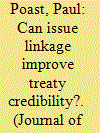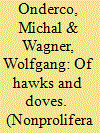| Srl | Item |
| 1 |
ID:
124137


|
|
|
|
|
| Publication |
2013.
|
| Summary/Abstract |
Can issue linkage, the combining of multiple issues into a single agreement, enhance the credibility of an agreement? I use the alliance relations of buffer states (states located between two recently or currently warring rivals) to test the claim that issue linkage enhances compliance with treaty obligations. The alliance relations of buffer states create a "hard case" for treaty compliance because, by being prone to invasion and occupation, buffer states have difficulties inducing states to remain committed to an alliance agreement. Hence, if linkage provisions can enhance the credibility of alliance commitments for buffer states, then linkage provisions should improve treaty compliance in nearly any context. I find that buffer states in alliances with trade provisions experience fewer opportunistic violations of the alliance terms, avoid occupation and invasion at a higher rate, and experience fewer third-party attacks than buffer states in other alliance arrangements.
|
|
|
|
|
|
|
|
|
|
|
|
|
|
|
|
| 2 |
ID:
114432


|
|
|
|
|
| Publication |
2012.
|
| Summary/Abstract |
The policies toward countries aspiring to acquire nuclear weapons continue to be heavily contested, differing even among countries that consider nuclear proliferation as one of the main threats to international security. This article maps the actual policies of liberal democracies toward Iran and North Korea along a continuum from confrontation to accommodation. Using data from an expert survey, the authors outline four main findings. First, policies toward both Iran and North Korea have become increasingly confrontational over time. Second, no policy convergence was observed among the states studied; that is, notwithstanding the adoption of joint sanctions, differences remained between states preferring confrontation and those opting for accommodation. Third, states maintained remarkably stable policy profiles over time. Finally, despite obvious differences between the norm violations of North Korea and Iran, states generally followed remarkably similar policies toward both countries. The authors' findings indicate that states exhibit stable preferences for either confrontation or accommodation toward nuclear aspirants. Although a comprehensive examination of the causes of these policy differences is beyond the scope of this article, the authors present evidence that a major cleavage exists between members and non-members of the Non-Aligned Movement, indicating that the degree to which nuclear aspirants' sovereignty should be respected is a main issue of contention.
|
|
|
|
|
|
|
|
|
|
|
|
|
|
|
|